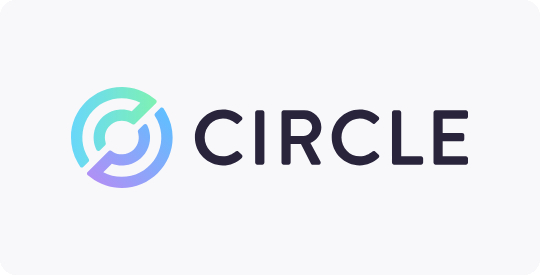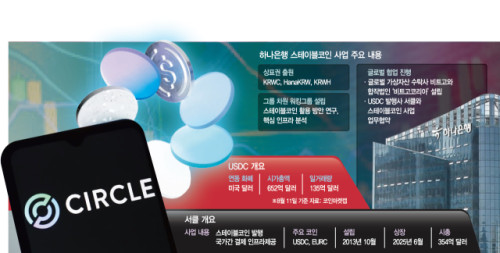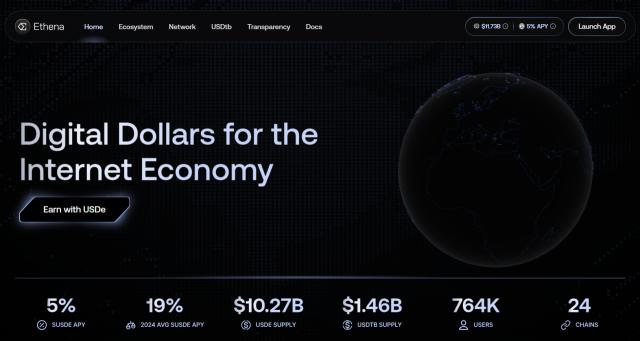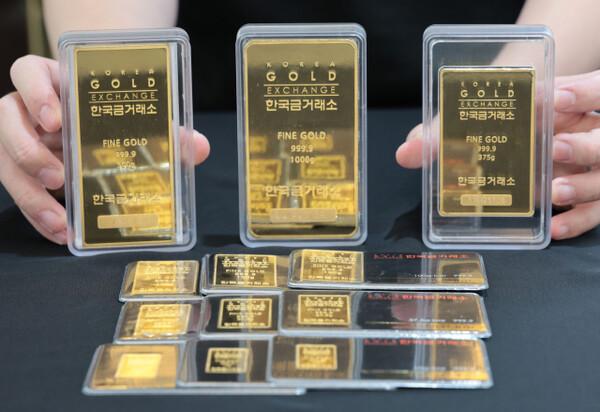
Circle, which issues USDC, the world's second-largest stablecoin market share, and Hana Bank have joined hands for the stablecoin business. The market expects the discussion on won-based stablecoin regulation to accelerate in line with Circle's top-level visit to Korea this month.
According to the cryptocurrency industry on the 12th, Circle recently signed a memorandum of understanding (MOU) with Hana Bank regarding stablecoin-related business.
This is a result of aligning the interests of Hana Financial, which wants to secure the won-based stablecoin market along with personal financial enhancement, and Circle, which has a strong interest in the Korean market. Previously, Circle issued the euro stablecoin EURC and invested in JPYC, a Japanese yen stablecoin issuer. An industry official said, "I understand that both companies have signed a comprehensive MOU remotely."
The two companies are known to have agreed on comprehensive cooperation regarding stablecoins, with specific details to be discussed later. ▷See page 2 of the article, page 9 of this newspaper on August 7

Circle and Hana Bank's collaboration is interpreted as being driven by growing expectations for won-based stablecoin issuance as domestic stablecoin legislation gains momentum. This aligns with Circle's exploration of overseas expansion and Hana Bank's proactive aim to secure market leadership.
Recently, political circles have been consecutively proposing bills related to stablecoins. In June, Democratic Party member Min Byung-deok was the first to represent the 'Digital Asset Basic Law' that includes a stablecoin regulatory framework. Subsequently, An Do-geol from the same party proposed a more specific bill on stablecoin regulations, and Kim Eun-hye from the People Power Party also introduced a related bill. It is known that Kang Jun-hyun, the ruling party's standing committee member, is preparing to propose the 'Digital Asset Innovation Law' that defines stablecoins. Financial authorities are also accelerating the preparation of government proposals.
Circle's interest in the Korean market is not unrelated to this institutionalization trend. USDC's issuer, which holds the second-largest global stablecoin market share, has been expanding into overseas markets by advocating a 'localization strategy' aligned with each country's regulations to build a global stablecoin network. In Europe, it issued a euro-linked stablecoin (EURC) while meeting the EU's cryptocurrency market regulation MiCA, and in Japan, it is entering the local market by strategically investing in JPYC. Professor Cho Jae-woo, head of the Blockchain Research Institute, explained, "Unlike Tether, the top stablecoin issuer focusing on listing and circulation, Circle is entering markets by collaborating in countries with established regulations that match the local environment."
Circle is known to have been making efforts to enter the domestic market, including holding private meetings with the Bank of Korea, financial authorities, and parliamentary officials in the first half of this year. The visit of Circle's second-in-command, Heath Tarbert, at the end of this month is also interpreted as being for this reason. An industry official said, "Currently, most companies in the financial, fintech, and virtual asset sectors are trying to meet and collaborate with Circle."
Hana Bank also appears to be targeting Circle, the current market leader, as a key partner to secure the future won-based stablecoin market. Last month, Hana Bank hinted at its market entry by filing multiple trademarks related to won-based stablecoins such as KRWC, HanaKRW, and KRWH. Particularly, the KRWC trademark uses the 'C' suffix after the legal currency unit, similar to USDC and EURC, leading to speculation about collaboration with Circle. Professor Cho predicted that "from a corporate perspective, they can aim to secure market leadership by utilizing Circle's experience, technological capabilities, and ecosystem."
Hana Bank is actively reviewing its stablecoin business. Specifically, it is conducting △monitoring domestic and international regulations, policies, and institutionalization trends △analyzing key infrastructure and technical requirements for stablecoin issuance △researching stablecoin application methods △building domestic and international partnerships. At the group level, it is operating a company-wide working group that encompasses custody, security token offerings (STO), and blockchain infrastructure, consolidating the expertise of each affiliate. It is also pursuing a custodial business license by establishing a joint venture 'Bitgo Korea' with global cryptocurrency custodian Bitgo.
Some speculate that Circle may be reviewing various scenarios, including won-based stablecoin issuance, establishing a local corporation, and investing in local payment infrastructure in line with domestic regulatory frameworks. In Japan, USDC was officially listed through SBI Group's subsidiary SBI VC Trade in March this year, and the SBI Group has strengthened cooperation by investing $50 million in Circle during its IPO in June. A financial industry official said, "Other financial institutions and virtual asset companies are also in contact with Circle, and the business direction is expected to become clearer as legislation gains momentum."
- Reporter Shin Jung-seop
< Copyright ⓒ Decenter, reproduction and redistribution prohibited >






